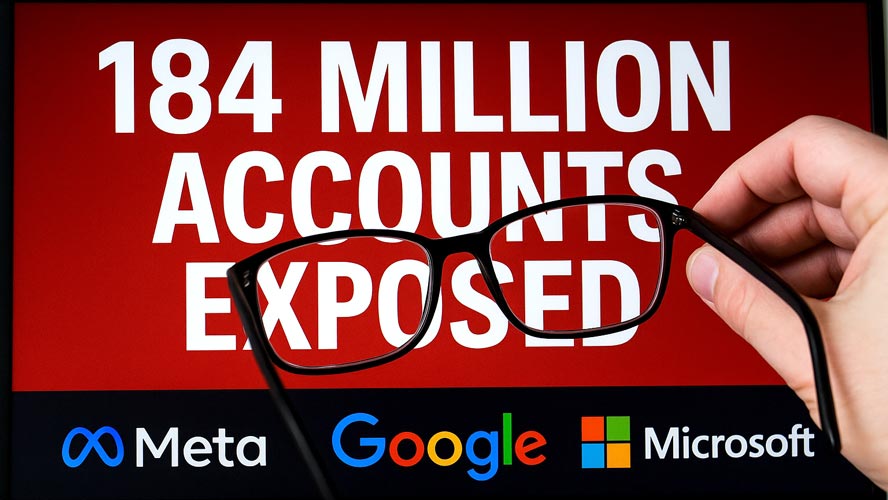184 Million Accounts Exposed – Are YOURS Among Them?

Brace yourself – this isn’t some clickbait scare story. This is real. Over 184 million user records have just been found leaking online in one of the most dangerous and irresponsible data exposures in recent memory.
And it involves the biggest names on the planet:
Meta. Google. Microsoft. That’s not hype. That’s confirmed.
A cybersecurity researcher uncovered a completely unprotected database sitting wide open on the internet. No password. No firewall. No encryption. Just 47 gigabytes of juicy, raw user data – emails, usernames, passwords – from some of the world’s most widely used platforms. Plaintext. Copy-paste ready for any cybercriminal to exploit.
This wasn’t even a hack. No firewall had to be breached. No James Bond-level tech wizardry needed. Someone simply left the front door open and hung up a sign that said Come Take What You Want. And we’re not talking about a couple of dodgy accounts from 2006.
We’re talking about current credentials linked to Facebook, Gmail, Outlook, and even 29 government domains.
If you’ve used one email address across multiple accounts (like most of us have), you’re on the list – or damned close to it.
The Breach Was So Dumb It’s Infuriating
The hosting company, World Host Group, stored this massive trove on an Elasticsearch server that anyone could access via browser. That’s right – no password required. The fact that this data dump even exists in 2025 is a total disgrace. But to leave it completely exposed to the public web?
That’s not just stupid – it’s criminally negligent.
This wasn’t tucked away in some deep corner of the dark web either. It was right there on the open internet for who-knows-how-long. Some hackers might’ve been harvesting this data silently for weeks before it was found and reported.
And here’s the kicker – the data’s now offline, but the damage? Already done.
What’s at Risk?
Think about what someone could do with your Gmail login, or your Facebook account:
- Access all your emails, maybe even banking resets
- Impersonate you to friends, family, or clients
- Log in to connected accounts via OAuth
- Or even steal your identity completely
If you use the same password (or similar ones) across accounts – and studies say over 60% of us do – this leak just turned your digital life into a ticking time bomb.
This Is Bigger Than You Think
This isn’t just a leak – this is a mass weaponisation of your online identity. Once your info is out, it never goes back in the box. Criminals buy, sell, and repurpose breached credentials endlessly. One day it’s a login. The next day it’s part of a phishing scam. A week later, someone’s applying for credit in your name.
The authorities aren’t going to rescue you. The hosting provider pulled the data down after it was discovered, but that’s like locking the vault after the gold’s gone. The damage is already rippling through the dark corners of the web.
What You Need To Do Right Bloody Now
Change your passwords immediately, especially for any Google, Meta, or Microsoft accounts.
- NEVER reuse passwords across different sites.
- Enable Two-Factor Authentication (2FA) wherever possible – email, banking, social media.
- Use a reputable password manager to generate and store complex, unique passwords.
- Watch your inbox and accounts closely – unexpected resets or login attempts? That’s a red flag.
- If you run a business – get your staff checked and retrained. This could be the start of a wave.
And don’t make the mistake of thinking “I’m too small for them to care.” Criminals run automated sweeps of these dumps. They don’t target you – they just target everyone, and see what sticks.
This Should Be a Wake-Up Call for All of Us
Tech giants talk a big game about AI and the future – but they can’t even secure our most basic data. This should terrify you. Not just for what it means today, but for what it says about the digital world we’re blindly trusting with our entire lives.
- Passwords aren’t private anymore. Emails aren’t sacred. Identity isn’t safe.
- The only way forward is to harden your defences. Because the bad guys? They’re already inside the gate.

